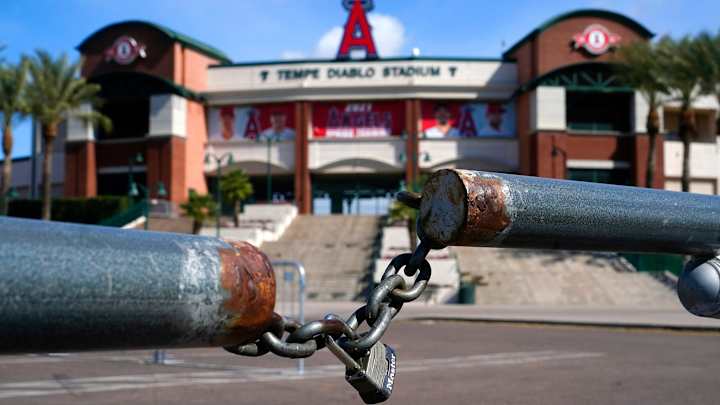Friction Grows as MLB CBA Talks Take a Step in the Wrong Direction

On the day after progress was made on a side issue, baseball owners and players proved again Saturday what happens when they try to touch core economic issues: anger.
Both sides made package proposals Saturday that led to so much frustration that the talks themselves joined Opening Day as jeopardized.
The players began the day by making their most comprehensive proposal, which included their first movement on the competitive balance tax since the owners began the lockout Dec. 2. They mirrored the owners’ past movement on the CBT: $2 million on three of the five years. The owners came back with adding $1 million to year two and dropping the first-tier tax rate from 50% to 45%, which still exceeds 20%, the one in the expired CBA. The two sides remain far apart on both thresholds and rates.
In their package players also made what they considered a major move by dropping their arbitration eligibility ask from 75% of two-to-three-year players to 35%. The current threshold of so-called Super Twos is 22%. The move did not resonate with owners because they regard any change to arbitration as non-negotiable.
Owners also had declared any changes to revenue sharing as a non-starter. The players moved on that issue as well. They reduced slightly their proposal to cut revenue sharing by $30 million.
The owners made a counterproposal that left the players so angry that, according to the Associated Press, they were deciding whether to continue negotiations Sunday or go home. Negotiations are scheduled to resume Sunday at 1 p.m., according to a source.
Just 24 hours earlier, the two sides appeared to gain traction via progress on a draft lottery. But that ended Saturday when owners tied the draft lottery to a suite of proposals in their counter. The owners were prepared to give players their version of the draft lottery, their proposed limit of five annual player options and the designated hitter in the National League while asking for their agreement on a 14-team expanded postseason and the right to implement rules changes quicker.
The rule-change proposal marked the first substantial instance in which the on-field product came up for negotiation. Under existing protocols, MLB can make rules changes such as the adoption of a pitch clock or a ban on defensive shifts only with the union’s consent or by implementation with one year of notice. The owners proposed to shrink that gap to 45 days. To do so, they proposed placing two player representatives on a committee with six management officials and one umpire. Players were described by one source as “very unhappy” with the proposal.
The events Saturday could only be classified as a step back—with a deadline of Monday to save Opening Day as scheduled as set by commissioner Rob Manfred. Every core economic proposal that came up caused friction. Other contentious issues were not addressed, such as the minimum salary and a bonus pool for pre-arbitration players.
More MLB Lockout Coverage:
• Baseball’s Greatest Threat Isn’t the Lockout
• This Is MLB’s Most Important Weekend in Two Decades
• Andrew Miller Explains Key Issues for Union in MLB Lockout
• Rob Manfred’s Entire Argument About Owning a Baseball Team Is False

Tom Verducci is a senior writer for Sports Illustrated who has covered Major League Baseball since 1981. He also serves as an analyst for FOX Sports and the MLB Network; is a New York Times best-selling author; and cohosts The Book of Joe podcast with Joe Maddon. A five-time Emmy Award winner across three categories (studio analyst, reporter, short form writing) and nominated in a fourth (game analyst), he is a three-time National Sportswriter of the Year winner, two-time National Magazine Award finalist, and a Penn State Distinguished Alumnus Award recipient. Verducci is a member of the National Sports Media Hall of Fame, Baseball Writers Association of America (including past New York chapter chairman) and a Baseball Hall of Fame voter since 1993. He also is the only writer to be a game analyst for World Series telecasts. He lives in New Jersey with his wife, with whom he has two children.